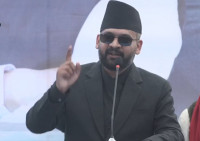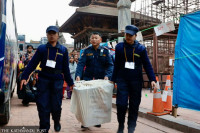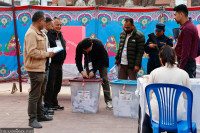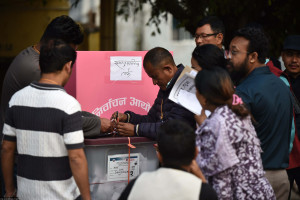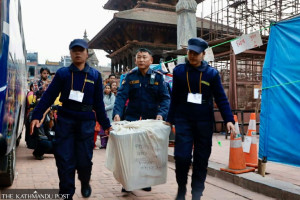National
Nepal, India home secretaries meeting in Delhi after 9 years
At the summit focussed on cross-border issues, Extradition Treaty and Mutual Legal Assistance are the key agendas.
Anil Giri
After a hiatus of nine years, the home secretaries of Nepal and India are meeting in New Delhi on Tuesday to discuss key cross-border security issues.
The two-day meeting will dwell on agendas ranging from an extradition treaty to mutual legal assistance to information and intelligence sharing. Other issues of discussion relate to border infrastructure, maintenance of boundary pillars and drug trafficking, Home Minister Ramesh Lekhak told the Post.
“This is a step forward and positive development especially because the meeting is taking place after nine years,” said Lekhak. The meeting will discuss issues related to cross-border crimes, border management, maintenance of boundary pillars, trafficking of drugs and humans across the border, and joint patrolling and surveillance of bordering areas.
Speaking at the National Assembly committee on federalism and national concerns, Lekhak said the government was going to discuss border issues with the southern neighbour.
Home Secretary Gokarna Mani Duwadi and his Indian counterpart Govind Mohan will lead their respective delegations to the meeting where officials from several line ministries will be participating.
Senior officials from the Prime Minister’s Office, the Ministry of Foreign Affairs, the Ministry of Law, Justice and Parliamentary Affairs, the Survey Department, Nepal Police, Armed Police Force, and Intelligence Department representatives will be attending the meeting.
Since there is a separate body to discuss international border demarcation and border problems, the mechanism led by the home secretary will work to control cross-border criminal activities, and drug and human trafficking, among others, said Lekhak.
The meeting also discussed ways to enhance cooperation between the security agencies as well as the local administration of the two countries.
The issue of signing the Extradition Treaty and Mutual Legal Assistance remains a key agenda of high-level meetings.
Discussions have taken place in the past on the signing of the new Extradition Treaty as well as agreement to Mutual Legal Assistance but there has been no progress, home ministry officials say.
Both Extradition Treaty and Mutual Legal Assistance will be discussed but the proposals have not reached the stage of signing, said home ministry spokesperson Ramchandra Tiwari.
Recently, Nepal forwarded its comments on the proposed agreement to the Mutual Legal Assistance but “it’s not sure we will agree and sign it”, said Tiwari. Some rounds of negotiations are due to be held but things are headed in the right direction, he added.
Once signed, the Mutual Legal Assistance will help both sides to hand over the people who have criminal records to the designated authority. The Extradition Treaty has been gathering dust since 2005.
The home secretaries of Nepal and India signed the “initial” agreement of Extradition Treaty in 2005 but due to differences on some of the proposed provisions including the issue of extraditing third-country nationals, the final agreement remains elusive.
Tiwari told the Post that both Extradition Treaty and Mutual Legal Assistance will be discussed in the meeting along with other issues such as border regulations and upgradation of the infrastructure, and border encroachment.
Since the meeting is taking place after the Pahalgam terrorist attack and the subsequent Indian request for Nepal to tighten the border, “we expect that India will raise the issue of terrorism and movement of suspicious people through the border and a growing number of madrassas along the border in the Nepali territory,” he added.
Indian officials often complain about the Nepali immigration system in Kathmandu and along the Nepal-India border, which some inimical powers could be taking advantage of.
The 13th meeting of the Nepal-India Joint Working Group on Border Management was held in Pokhara in March. The meeting discussed and reviewed the status of repair and maintenance of boundary pillars, cross-border criminal activities; strengthening of border infrastructure particularly the ICPs, roads and railway-network; empowerment and capacity building of security-related institutions; and ways to strengthen cooperation in disaster risk reduction and management. The recommendations forwarded by the joint-secretary-level meeting will be discussed and approved by the meeting, said officials.
The joint working group on border also reviewed progress towards concluding the Mutual Legal Assistance Treaty and the works of Border District Coordination Committee between the two sides, according to a statement released by the Indian Embassy.
Agenda items of enhancing the capacity of integrated check posts built in some key border points, assistance in seeking forensic laboratory support between the institutions of Nepal and India, issues related to open border, and circulation of fake currency notes will be discussed, said Lekhak.
According to the minister, three different agencies oversee issues related to the border and boundary between Nepal and India. The home secretary-level mechanism manages and discusses border security, crime control and maintenance of the boundary pillars while the Survey Department leads in boundary demarcation. The Ministry of Foreign Affairs addresses any border disputes through diplomatic channels.




 12.32°C Kathmandu
12.32°C Kathmandu


